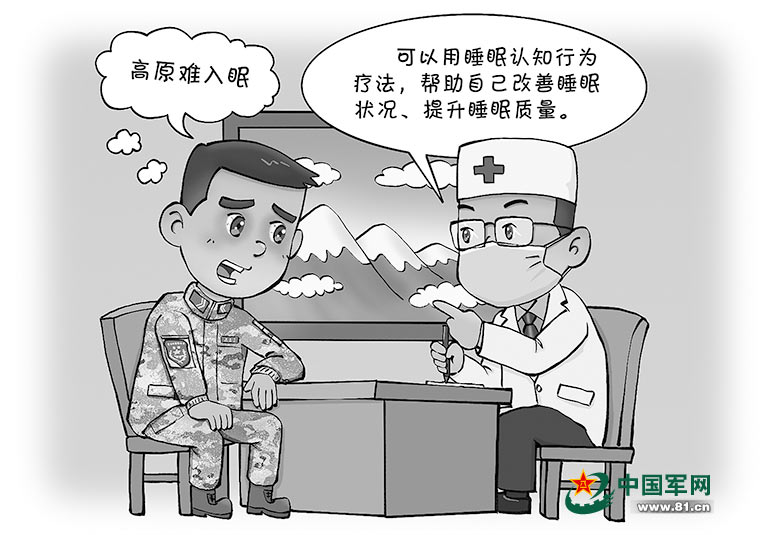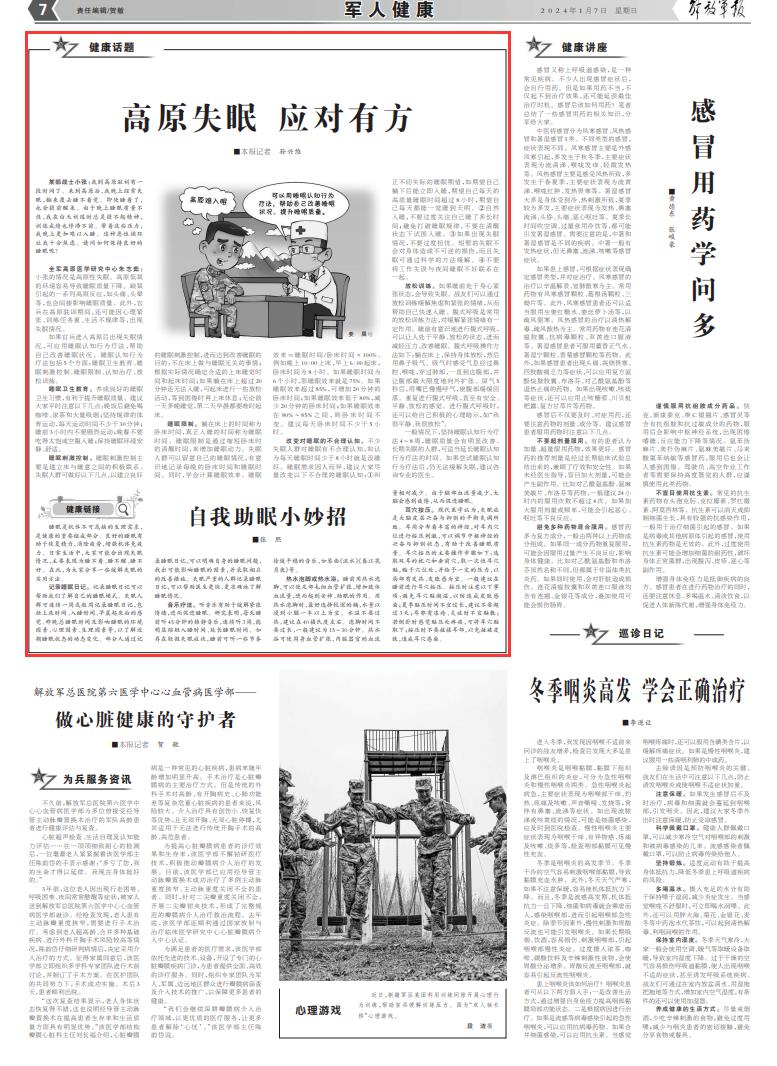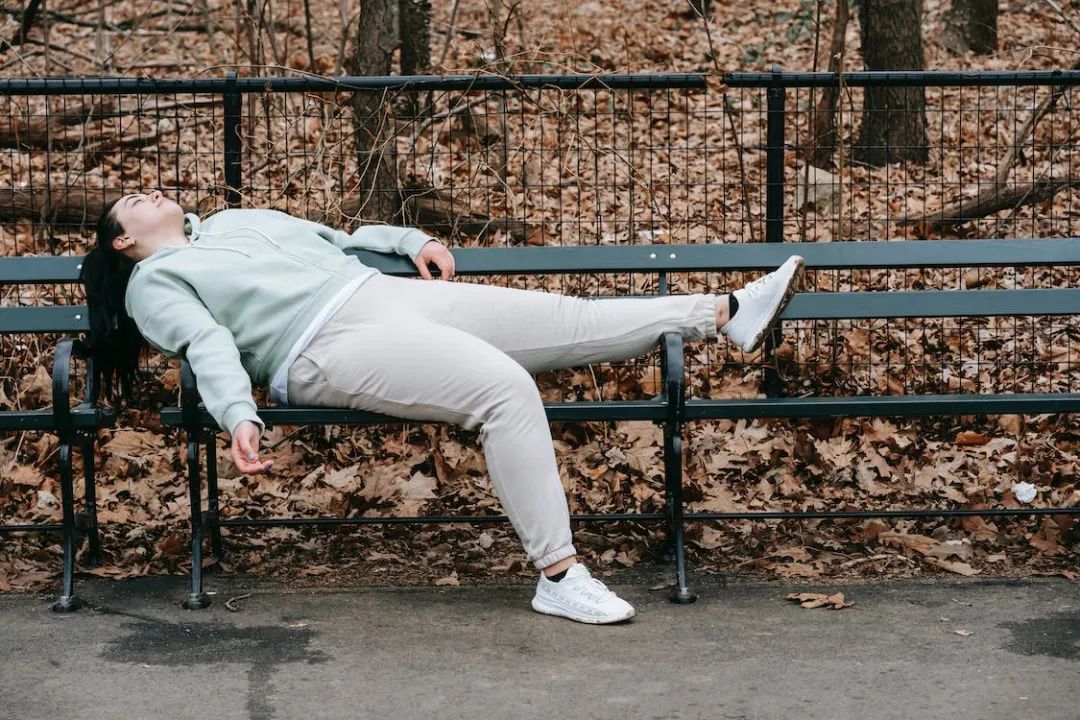How to do insomnia in plateau training? Experts from the PLA Plateau Medical Research Center have these methods.
Coping well with insomnia at high altitude
■ Liberation Army Daily reporter Sun Xingwei

Jiang chenhui
A soldier Xiao Zhang: I have been stationed in the plateau for some time. After coming to the plateau, I often have insomnia at night, and I can’t sleep over and over again. Even if you fall asleep, you will wake up early. Due to the poor quality of sleep at night, I always feel depressed during daytime training, and my training results are stagnant. With these pressures, it is more difficult for me to sleep at night. This vicious circle makes me very anxious. How to keep a good sleep?
Zhu Zhiru, Military Plateau Medical Research Center: Xiao Zhang’s condition is high altitude insomnia. The hypoxia environment at high altitude can easily lead to the decline of sleep quality. A series of altitude sickness caused by hypoxia, such as headache and dizziness, will also indirectly affect the quality of sleep. In addition, officers and men may suffer from insomnia due to psychological stress, heavy training tasks and irregular life during their training at high altitude.
If the officers and men suffer from insomnia after entering the plateau, they can apply sleep cognitive behavioral therapy to help them improve their sleep. Sleep cognitive behavioral therapy includes five aspects: sleep hygiene education, sleep stimulation control, sleep restriction, cognitive therapy and relaxation training.
Sleep hygiene education. Developing good sleep hygiene habits is conducive to improving sleep quality. I suggest you pay attention to the following points: avoid drinking coffee, strong tea and smoking a lot after dinner; Adhere to regular sports, and exercise for not less than 30 minutes every day; Do not exercise vigorously within 3 hours before going to bed; Don’t eat too much at dinner or fall asleep on an empty stomach; Keep the sleeping environment quiet and comfortable.
Sleep stimulation control. Sleep stimulus control is mainly to establish a positive relationship between bed and sleepiness. Insomnia people can do the following to establish good sleep stimulation control, and then achieve the purpose of improving sleep: do not do things unrelated to sleep in bed; Determine the appropriate time to go to bed and get up according to the actual situation; If you can’t fall asleep after lying in bed for more than 20 minutes, you can get up and do some relaxation activities, and then go to bed when you are sleepy; No matter how late you went to bed the day before, you should get up on time the next morning.
Sleep restriction. The time spent lying in bed is called bed time, and the time to really fall asleep is called sleep time. Sleep restriction is to increase sleep motivation by shortening the waking time in bed. Insomnia people can pay attention to their sleep situation and consciously record the bed rest time and sleep time every night. At the same time, learn to calculate sleep efficiency. Sleep efficiency = sleep time/bed time ×100%. For example, go to bed at 10: 00 at night, get up at 6: 00 in the morning, and stay in bed for 8 hours. If the sleep time is 6 hours, the sleep efficiency is 75%. If the sleep efficiency exceeds 85%, you can increase the bed rest time by 20 minutes; If the sleep efficiency is lower than 80%, reduce the bed rest time by 20 minutes; If the sleep efficiency is between 80% and 85%, the bed rest time will not change. It is recommended to stay in bed for at least 5 hours every day.
Change the unreasonable cognition of sleep. Many insomniacs have unreasonable cognition of sleep, such as thinking that they don’t sleep well if they sleep less than 8 hours a day. Sleep needs vary from person to person, so it is suggested that you try to change the following unreasonable sleep cognition: ① Correct unrealistic sleep expectations, such as expecting to fall asleep immediately after lying down, expecting to get more than 8 hours of high-quality sleep every day, and expecting to sleep until dawn every day. 2 fall asleep naturally, don’t pay too much attention to how long you have slept; Avoid breaking sleep patterns and trying to fall asleep while awake. 3 If there is insomnia, don’t worry too much. Transient insomnia will not cause irreversible damage to the body, and insomnia can be alleviated by scientific methods. ④ Don’t associate work mistakes with poor sleep at night.
Relax training. If you are in a state of mental and physical tension before going to bed, it will lead to insomnia. Comrades can relieve anxiety and tension through relaxation training, thus helping them to fall asleep quickly. Abdominal breathing is a commonly used relaxation training method, which has a certain effect on relieving tension. Consciously carrying out abdominal breathing before going to bed can make people in a calm and relaxed state, thus reducing stress and improving sleep. The operation method of abdominal breathing is as follows: lie on the bed, keep your body relaxed, and then inhale through your nose. When inhaling, feel the breath pass through the nasal cavity, throat, lungs, and reach the abdomen, and let the abdomen expand outward to the maximum extent. After holding your breath for 5 seconds, exhale slowly through your mouth to make your abdomen slowly fall back. Repeat abdominal breathing until you feel safe, calm and relaxed. When doing abdominal breathing, you can also give yourself positive psychological hints, such as "I am calm and I am relaxed".
Under normal circumstances, the quality of sleep will be improved obviously if you insist on cognitive behavioral therapy for 4 ~ 8 weeks. People with long-term insomnia can appropriately extend the time of sleep cognitive behavioral therapy. If you still can’t relieve insomnia after trying sleep cognitive behavioral therapy, it is recommended to consult a professional doctor.
Health link
Small coup of self-help sleep
■ Zhang Xi
Sleep is an indispensable physiological demand of the body and an important part of health. Good sleep helps to restore energy, eliminate fatigue and enhance the body’s immunity. In daily life, people may suffer from insomnia, mainly manifested as being unable to sleep, unable to wake up and unable to sleep well. Here, I would like to share some practical methods to relieve insomnia.
Keep a sleep diary. Keeping a sleep diary can help us understand our sleep patterns. Insomnia people can keep a sleep diary for a week or several weeks, including the time of going to bed, the time of falling asleep, the feeling after getting up in the morning, the total sleep time last night, the environmental factors, psychological factors and physiological factors that affect sleep, etc., in order to understand the dynamic changes of sleep state in the near future. By keeping a sleep diary, some people can find out their sleep problems, find out the factors that may affect sleep, and take corresponding improvement measures. Keeping a sleep diary for people with severe insomnia can help doctors understand their sleep more quickly and accurately.
Music therapy. Listening to music helps to relieve tension, thus promoting sleep. Studies have shown that listening to calming music for 45 minutes before going to bed every day for 3 weeks can obviously shorten the sleep time and prolong the sleep time. If you have mild insomnia symptoms, you can listen to some music with slow and steady rhythm before going to bed, such as Qin Qu "Running Water" and "Moonlit Night on a Spring River".
Hot foot bath or hot bath. Soaking feet with hot water before going to bed can dilate the capillaries of feet and increase the blood flow of limbs, thus playing the role of calming the nerves and helping sleep. When soaking feet with hot water, it is best to choose a deeper bucket, and the amount of water should be soaked to more than half of the calf. The water temperature should not be overheated, and it is recommended to be around 40 degrees Celsius. Don’t soak your feet for too long. Generally, it is recommended to soak your feet for 15 ~ 30 minutes. Hot water bath can dilate the blood vessels in the whole body and reduce the blood flow of internal organs. As the blood flow to the brain decreases, the brain will feel tired, thus promoting sleep.
Auricular point pressing. Modern medicine believes that insomnia is caused by the imbalance between excitement and inhibition in the cerebral cortex. There are abundant nerves around the ear. Pressing and stimulating the points in the ear can adjust the excitement and inhibition of the central nervous system and help improve the quality of sleep. The main operation steps of auricular point pressing are as follows: Select the pillow point and the point before hanging, take a disposable auricular point paste, and apply some pressure to it, which is suitable for local fever and swelling. It is generally recommended to press auricular points before going to bed. Pay attention to the following items when pressing: avoid sticking ear points to be wet to prevent skin infection; The sticking time in summer should not be too long, and it is recommended not to exceed 3 days; It is not suitable to apply when there is chilblain and inflammation in the ear; If you feel pain at the sticking point when lying on your side, you can take off the ear acupoint sticking; Don’t rub your ears when pressing, so as not to rub your skin and cause ear point infection.















